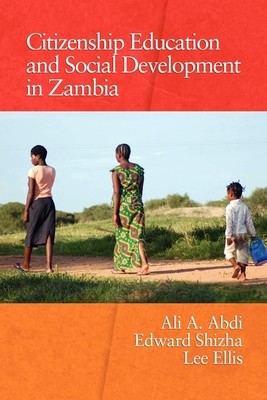
- We will send in 10–14 business days.
- Publisher: Information Age Publishing
- Year: 2010
- Pages: 170
- ISBN-10: 1607523930
- ISBN-13: 9781607523932
- Format: 15.6 x 23.4 x 1.1 cm, hardcover
- Language: English
- SAVE -10% with code: EXTRA
Citizenship Education and Social Development in Zambia (Hc) (e-book) (used book) | bookbook.eu
Reviews
Description
Zambia, the butterfly-shaped, central African country has a population of about 11 million people, and as other Sub-Saharan African countries, has been trying to democratize since the early 1990s. Clearly, though, the promise of political reform did not fulfill the expectations of the public, and with about 60 percent of the population living below the poverty line, many Zambians are no longer confident that more open political systems can improve their lives. But the problem may not be inherent in the political process itself, and could be found more in the apparent disconnection between people's needs and the way the country's affairs are run. It is with respect to these and related issues that this book emphasizes the crucial relationship between education and political participation, and specifically highlights citizenship education as essential for Zambia's social development. Social development, which should comprise, inter alia, the economic, political, and cultural wellbeing of societies can be enhanced by citizenship education, which focuses on elevating people's understanding of their rights and responsibilities vis-Ã -vis government institutions, structures and functions. Indeed, it is the centrality of the political component in people's lives, especially its relationship with public policy and public programs that should underline the important role of citizenship education. In describing these issues, the book analyzes the role of the media, women's groups and youth in enhancing the political, educational, and by extension, the economic lives of the Zambian people. The book should interest students and scholars of Zambian (as well as African) education, politics, and social development. It should also be useful for policy makers, institutional managers and both public and para-public leaders in Zambia and elsewhere in the continent.
EXTRA 10 % discount with code: EXTRA
The promotion ends in 15d.18:16:18
The discount code is valid when purchasing from 10 €. Discounts do not stack.
- Publisher: Information Age Publishing
- Year: 2010
- Pages: 170
- ISBN-10: 1607523930
- ISBN-13: 9781607523932
- Format: 15.6 x 23.4 x 1.1 cm, hardcover
- Language: English English
Zambia, the butterfly-shaped, central African country has a population of about 11 million people, and as other Sub-Saharan African countries, has been trying to democratize since the early 1990s. Clearly, though, the promise of political reform did not fulfill the expectations of the public, and with about 60 percent of the population living below the poverty line, many Zambians are no longer confident that more open political systems can improve their lives. But the problem may not be inherent in the political process itself, and could be found more in the apparent disconnection between people's needs and the way the country's affairs are run. It is with respect to these and related issues that this book emphasizes the crucial relationship between education and political participation, and specifically highlights citizenship education as essential for Zambia's social development. Social development, which should comprise, inter alia, the economic, political, and cultural wellbeing of societies can be enhanced by citizenship education, which focuses on elevating people's understanding of their rights and responsibilities vis-Ã -vis government institutions, structures and functions. Indeed, it is the centrality of the political component in people's lives, especially its relationship with public policy and public programs that should underline the important role of citizenship education. In describing these issues, the book analyzes the role of the media, women's groups and youth in enhancing the political, educational, and by extension, the economic lives of the Zambian people. The book should interest students and scholars of Zambian (as well as African) education, politics, and social development. It should also be useful for policy makers, institutional managers and both public and para-public leaders in Zambia and elsewhere in the continent.


Reviews